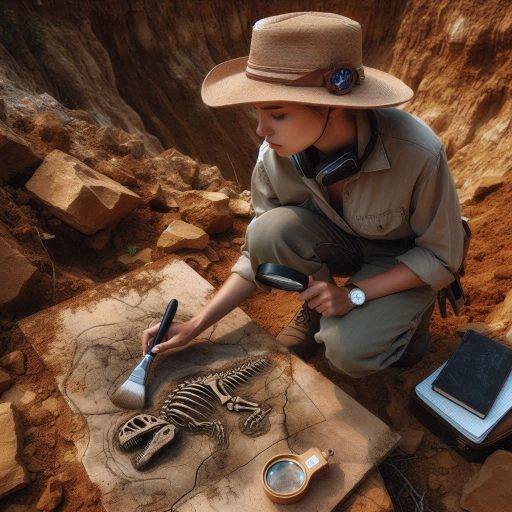Introduction
Pharmacologists play a crucial role in vaccine development.
They study how drugs interact with biological systems to ensure safety and efficacy.
Understanding pharmacology helps create effective vaccines that protect public health.
Pharmacologists analyze the mechanisms behind vaccine responses, which informs the design of new vaccines.
Their expertise aids in identifying suitable antigens for vaccine formulations.
This knowledge is vital for developing vaccines that elicit strong immune responses.
Additionally, pharmacologists assess potential side effects and interactions with other medications.
This assessment ensures that vaccines are safe for diverse populations.
By understanding pharmacokinetics and pharmacodynamics, they can predict how vaccines behave in the body.
Their involvement extends to conducting clinical trials, where they evaluate vaccine efficacy and safety.
They work closely with regulatory agencies to ensure compliance with safety standards.
Moreover, pharmacologists collaborate with other experts to address emerging health threats.
Their insights lead to innovative solutions that meet public health needs.
Ultimately, a strong foundation in pharmacology is essential for developing effective vaccines.
As vaccine development evolves, the role of pharmacologists will remain critical in protecting global health.
Understanding Pharmacology
Definition of Pharmacology
Pharmacology is the study of drugs and their effects on living systems.
It encompasses various disciplines, including biochemistry, physiology, and molecular biology.
Pharmacologists investigate how drugs interact with biological systems to produce therapeutic effects.
They analyze the mechanisms of drug action and how these drugs can improve health outcomes.
Role of Pharmacologists in Studying Drug Interactions and Mechanisms
Pharmacologists play a critical role in studying drug interactions.
They examine how different substances affect each other when administered together.
This understanding is vital in vaccine development, where multiple components may be involved.
For example, pharmacologists assess potential interactions between vaccines and existing medications.
Moreover, pharmacologists explore the mechanisms by which vaccines work.
They study how the immune system responds to vaccines.
This involves understanding antigen recognition, immune activation, and memory formation.
By elucidating these processes, pharmacologists contribute to creating effective vaccines.
Pharmacologists also evaluate the safety and efficacy of vaccine candidates.
They conduct preclinical studies to gather data on potential side effects.
These studies help identify any adverse reactions that might arise from vaccination.
Understanding these reactions is crucial for ensuring public safety.
Additionally, pharmacologists collaborate with other scientists in vaccine development.
They work closely with immunologists and microbiologists to enhance vaccine formulations.
This collaboration fosters the exchange of ideas and accelerates the research process.
Pharmacologists also focus on optimizing dosage regimens for vaccines.
They determine the appropriate dosage needed to achieve the desired immune response.
Proper dosing is essential to maximize vaccine effectiveness while minimizing adverse effects.
Furthermore, pharmacologists assess the pharmacokinetics of vaccine components.
They study how vaccines are absorbed, distributed, metabolized, and eliminated by the body.
This knowledge helps ensure that vaccines reach their targets effectively.
Moreover, pharmacologists contribute to clinical trials for vaccines.
They design and oversee trials to evaluate vaccine safety and efficacy.
By analyzing trial data, pharmacologists help determine the best approaches for vaccination.
Pharmacology is a vital field in vaccine development.
Pharmacologists study drug interactions and mechanisms to enhance vaccine effectiveness.
Their expertise ensures that vaccines are safe and effective for public use.
Vaccine Development Process
Overview of How Vaccines Are Created
The vaccine development process involves several critical stages.
It begins with basic research, where scientists identify potential antigens.
Antigens are substances that stimulate an immune response.
Researchers explore various pathogens to determine suitable candidates for vaccines.
After identifying promising antigens, researchers proceed to preclinical testing.
This stage evaluates the safety and efficacy of vaccine candidates in laboratory settings.
They conduct experiments using cell cultures and animal models to gather initial data.
Once preclinical testing shows positive results, the process moves to clinical trials.
Clinical trials involve multiple phases, starting with Phase 1.
In this phase, researchers test the vaccine on a small group of healthy volunteers.
They assess the vaccine‘s safety, dosage, and any potential side effects.
Phase 2 expands the trial to a larger group.
Researchers evaluate the vaccine‘s effectiveness in producing an immune response.
They also continue monitoring safety and side effects in a more diverse population.
Phase 3 involves even larger groups of participants.
This phase assesses the vaccine’s overall effectiveness in preventing disease.
Researchers compare the vaccinated group with a control group to determine success rates.
After completing clinical trials, researchers analyze the data.
They compile reports demonstrating the vaccine’s safety and efficacy.
This data is submitted to regulatory agencies for review.
If regulatory agencies approve the vaccine, production begins.
Manufacturers scale up production processes to meet public demand.
Quality control is crucial during this stage to ensure consistency and safety.
Importance of Pharmacologists in Each Stage of Development
Pharmacologists play a vital role throughout the vaccine development process.
In the initial research phase, they identify potential antigens and study their properties.
Their expertise helps researchers select the most promising candidates for further testing.
During preclinical testing, pharmacologists assess the safety of vaccine candidates.
They design experiments to evaluate toxicity and side effects in animal models.
Their knowledge ensures that only safe candidates proceed to clinical trials.
In clinical trials, pharmacologists contribute to designing trial protocols.
They determine appropriate dosages and evaluate immune responses.
Their insights help optimize the trial’s effectiveness and safety.
Pharmacologists also analyze data from clinical trials.
They assess the vaccine’s pharmacokinetics and pharmacodynamics.
This analysis is crucial for understanding how the vaccine works within the body.
Once the vaccine receives regulatory approval, pharmacologists assist in quality control.
They ensure that manufacturing processes adhere to safety and efficacy standards.
Their involvement guarantees the production of safe and effective vaccines.
Moreover, pharmacologists continue to monitor vaccine safety post-approval.
They participate in pharmacovigilance activities to track adverse effects.
This ongoing surveillance helps maintain public confidence in vaccination programs.
The vaccine development process relies on the expertise of pharmacologists at every stage.
Their contributions enhance the safety and effectiveness of vaccines.
By understanding the complexities of vaccine development, pharmacologists play a crucial role in public health.
Their work ensures that vaccines are safe, effective, and widely available to combat infectious diseases.
Read: The Future of Botany: Emerging Fields and Innovations
Testing and Evaluation
Pharmacologists’ Role in Testing Vaccines for Safety and Efficacy
Pharmacologists play a critical role in the testing and evaluation of vaccines.
They design and conduct experiments to assess the safety and efficacy of vaccine candidates.
Their expertise ensures that vaccines meet the necessary regulatory standards before public use.
In preclinical testing, pharmacologists perform various assessments.
They study the vaccine’s pharmacokinetics, examining how the body absorbs, distributes, metabolizes, and excretes the vaccine components.
This information is crucial for understanding the vaccine‘s effects on different populations.
During preclinical studies, pharmacologists also evaluate potential side effects.
They use animal models to identify adverse reactions.
This step helps determine the appropriate dosage levels for human trials.
Ensuring safety at this stage is essential to protect volunteers in clinical trials.
Once preclinical testing shows positive results, pharmacologists assist in clinical trials.
They help design trial protocols, ensuring compliance with regulatory requirements.
Their involvement is vital in determining participant selection, dosing schedules, and monitoring methods.
In Phase 1 trials, pharmacologists focus on assessing safety.
They monitor participants for immediate side effects and adverse reactions.
Their rigorous data collection allows researchers to adjust dosage levels as needed.
Phase 2 trials evaluate the vaccine’s immunogenicity.
Pharmacologists analyze the immune response generated by the vaccine.
They compare the immune response in vaccinated individuals to those in the control group.
This comparison helps gauge the vaccine‘s effectiveness.
During Phase 3 trials, pharmacologists oversee larger populations.
They track the vaccine’s ability to prevent disease among diverse groups.
Their continuous monitoring helps identify any emerging safety concerns.
This stage provides critical evidence of the vaccine’s effectiveness in real-world settings.
Pharmacologists also analyze data collected during clinical trials.
They use statistical methods to interpret results and assess the vaccine’s safety profile.
Their expertise is crucial for determining whether a vaccine should proceed to regulatory approval.
Importance of Thorough Evaluation in Vaccine Development
Thorough evaluation is essential in vaccine development.
It ensures that vaccines are safe, effective, and reliable for public use.
A comprehensive assessment minimizes the risk of adverse effects after vaccination.
Regulatory agencies require extensive testing before approving vaccines.
They rely on data from pharmacologists to make informed decisions.
This rigorous evaluation process builds public trust in vaccination programs.
Moreover, continuous evaluation remains crucial after vaccine approval.
Pharmacologists monitor long-term safety and efficacy through pharmacovigilance.
This ongoing surveillance helps identify rare side effects that may not appear during clinical trials.
Pharmacologists play an indispensable role in the testing and evaluation of vaccines.
Their work ensures that vaccines undergo rigorous safety and efficacy assessments.
Thorough evaluation protects public health by guaranteeing that vaccines meet the highest standards.
This dedication to safety and effectiveness ultimately enhances global vaccination efforts.
Read: What Does a Geologist Do? Career Overview and Insights

Regulatory Approval
How Pharmacologists Contribute to Getting Vaccines Approved by Regulatory Agencies
Pharmacologists play a vital role in the regulatory approval process for vaccines.
They ensure that vaccines meet the safety and efficacy standards set by regulatory agencies.
Their expertise guides the preparation of comprehensive data packages needed for vaccine approval.
First, pharmacologists help design clinical trials that align with regulatory requirements.
They focus on selecting appropriate endpoints that demonstrate a vaccine’s effectiveness.
By carefully crafting trial protocols, pharmacologists ensure that the data collected is robust and reliable.
During the trial phase, pharmacologists monitor the safety of vaccine candidates.
They assess adverse events and side effects reported by trial participants.
This vigilance helps build a safety profile that regulatory agencies will review.
Pharmacologists also gather extensive data on the vaccine’s immunogenicity.
They analyze immune responses, measuring how well the vaccine stimulates the immune system.
This data is crucial for demonstrating that the vaccine can effectively protect against disease.
After trial completion, pharmacologists compile detailed reports summarizing the findings.
These reports include data on safety, efficacy, and immunogenicity.
Regulatory agencies require this comprehensive information to make informed approval decisions.
Pharmacologists prepare documentation according to regulatory guidelines.
They ensure that submissions meet the required scientific and regulatory standards.
This meticulous attention to detail helps facilitate a smoother approval process.
Pharmacologists also engage in discussions with regulatory agencies during the review process.
They provide clarification on data and address any questions or concerns raised.
This open communication fosters trust and collaboration between researchers and regulators.
Moreover, pharmacologists contribute to post-marketing surveillance.
They monitor the vaccine’s performance once it receives regulatory approval.
Their ongoing evaluation helps ensure that the vaccine remains safe and effective in the general population.
Ensuring Vaccines Meet Safety and Efficacy Standards
Safety and efficacy are paramount in vaccine development.
Regulatory agencies like the FDA and EMA require extensive evidence before granting approval.
Pharmacologists play a crucial role in generating this evidence.
Pharmacologists evaluate the potential risks associated with vaccines.
They conduct risk-benefit analyses to determine whether a vaccine’s benefits outweigh its risks.
This analysis is crucial for regulatory decision-making.
To ensure safety, pharmacologists investigate the vaccine’s composition and manufacturing process.
They assess whether the vaccine is produced consistently and meets quality standards.
This scrutiny helps prevent contamination and ensures product integrity.
Pharmacologists also analyze data on vaccine effectiveness across different populations.
They evaluate how demographic factors may impact vaccine responses.
This evaluation ensures that the vaccine is safe and effective for diverse groups.
Pharmacologists are essential in securing regulatory approval for vaccines.
They contribute their expertise to ensure vaccines meet safety and efficacy standards.
Their dedication to quality and compliance protects public health and enhances confidence in vaccination programs.
Read: Educational Path: Becoming a Geologist in the USA
Gain More Insights: The Future of Anthropology: Trends and Predictions
Post-Market Surveillance
Role of Pharmacologists in Monitoring Vaccine Safety After Approval
Pharmacologists play a critical role in post-market surveillance of vaccines.
They monitor vaccine safety after approval to identify any potential issues.
Their expertise ensures that the benefits of vaccines continue to outweigh the risks.
Once a vaccine is on the market, pharmacologists gather data on its performance.
They analyze reports of adverse events from healthcare providers and the public.
This analysis helps detect any patterns that may indicate safety concerns.
Pharmacologists work closely with regulatory agencies during this monitoring phase.
They provide valuable insights into the ongoing safety of vaccines.
Their role involves evaluating data from various sources, including electronic health records and clinical databases.
They also utilize sophisticated statistical methods to assess vaccine safety.
By employing these techniques, pharmacologists can identify rare side effects.
Early detection of these effects is crucial for public safety.
Pharmacologists contribute to risk communication strategies.
They educate healthcare providers and the public about vaccine safety.
This information helps address concerns and reinforces the importance of vaccination.
In addition, pharmacologists may conduct studies to explore specific safety issues.
For instance, they might investigate a reported side effect in more detail.
These studies provide additional context and help clarify any uncertainties.
Importance of Continued Research and Surveillance
Continued research and surveillance are essential in vaccine development.
The landscape of vaccine safety can evolve as more data becomes available.
Pharmacologists remain vigilant in tracking any changes that may arise.
Long-term monitoring helps ensure vaccines maintain their safety profile.
Some side effects may only emerge after widespread use.
Pharmacologists are prepared to respond to any emerging safety signals.
They also assess vaccine effectiveness in real-world settings.
This evaluation is vital for understanding how well vaccines protect against disease.
Pharmacologists analyze data on infection rates and breakthrough cases.
Collaboration is key in post-market surveillance.
Pharmacologists often work with public health organizations and epidemiologists.
This collaboration enhances data collection and strengthens safety monitoring efforts.
Pharmacologists also contribute to the development of new surveillance methodologies.
They explore innovative ways to gather and analyze safety data.
This commitment to improvement helps ensure that monitoring systems remain effective.
Public trust in vaccines is crucial for vaccination programs.
Pharmacologists help build this trust by ensuring transparency in safety monitoring.
Clear communication about vaccine safety fosters public confidence in immunization efforts.
Pharmacologists play a vital role in post-market surveillance of vaccines.
Their ongoing monitoring efforts ensure that vaccines remain safe for the public.
Continued research and vigilance are essential for maintaining vaccine safety and effectiveness.
Read: Botany Career Fairs and Networking Events
Discover More: Educational Pathways to Become a Nanotechnologist
Collaboration with Other Experts
How Pharmacologists Work with Immunologists, Microbiologists, and Other Experts in Vaccine Development
Pharmacologists play a vital role in vaccine development through collaboration.
They work closely with immunologists, microbiologists, and other experts.
This interdisciplinary teamwork enhances the effectiveness and safety of vaccines.
Pharmacologists contribute their knowledge of drug interactions and mechanisms.
They ensure that vaccine formulations are safe and effective.
Their expertise is crucial during the early stages of vaccine development.
Immunologists study the immune response to vaccines.
They provide insights into how the body reacts to immunizations.
Pharmacologists collaborate with immunologists to optimize vaccine design for better immune responses.
Microbiologists examine the pathogens targeted by vaccines.
They help identify the specific components necessary for effective immunization.
Pharmacologists rely on their expertise to develop vaccines that target these pathogens effectively.
Together, these experts design comprehensive studies.
They evaluate the safety and efficacy of vaccines in clinical trials.
This collaboration ensures that all aspects of vaccine development are thoroughly addressed.
Pharmacologists and immunologists frequently discuss vaccine adjuvants.
Adjuvants enhance the immune response to vaccines.
Understanding how different adjuvants work helps pharmacologists create more effective vaccine formulations.
Collaboration extends beyond research and development.
Pharmacologists also engage with regulatory experts to ensure compliance.
This partnership helps navigate the complex approval process for vaccines.
Importance of Interdisciplinary Collaboration in Creating Effective Vaccines
Interdisciplinary collaboration is essential for creating effective vaccines.
Each expert brings unique insights that contribute to the overall development process.
This diversity of knowledge leads to more comprehensive solutions.
The rapid pace of vaccine development demands collaboration.
Experts must share information quickly and effectively.
This teamwork accelerates the development of vaccines, especially during public health emergencies.
Collaborating with public health officials is also crucial.
Pharmacologists and other experts work together to understand community needs.
This understanding helps tailor vaccine strategies to specific populations.
Ongoing communication fosters a collaborative environment.
Regular meetings and discussions keep all parties informed.
This transparency helps maintain a unified vision for vaccine development.
Collaboration promotes innovation in vaccine technology.
Experts exchange ideas about new approaches and methodologies.
This exchange can lead to breakthroughs in vaccine design and delivery.
Pharmacologists also benefit from partnerships with academic institutions.
Collaborating with researchers enhances their understanding of emerging scientific trends.
This knowledge is vital for staying current in the field of vaccine development.
Finally, interdisciplinary collaboration builds public trust.
When experts work together, they demonstrate a commitment to vaccine safety and efficacy.
This trust is essential for encouraging vaccination in communities.
Pharmacologists play a key role in collaborating with other experts in vaccine development.
Their partnerships with immunologists, microbiologists, and public health officials enhance vaccine safety and efficacy.
Interdisciplinary collaboration is essential for creating effective vaccines and responding to public health needs.
Find Out More: Plant Pathology: Studying Plant Diseases
Transform Your Career Today
Unlock a personalized career strategy that drives real results. Get tailored advice and a roadmap designed just for you.
Start NowConclusion
Pharmacologists play a vital role in vaccine development.
Their expertise ensures vaccines are safe and effective for public use.
They conduct critical research on drug interactions and mechanisms, contributing valuable insights.
Pharmacologists collaborate with immunologists and microbiologists to enhance understanding of pathogens.
This teamwork leads to innovative vaccine solutions for emerging health threats.
During testing, pharmacologists evaluate safety and efficacy through rigorous clinical trials.
Their oversight is crucial for public confidence in vaccines.
They also contribute to regulatory approval processes by preparing comprehensive documentation.
This ensures that vaccines meet safety and efficacy standards set by regulatory agencies.
After approval, pharmacologists monitor vaccine safety through post-market surveillance.
They analyze data on adverse events to ensure ongoing safety for all populations.
Pharmacologists educate healthcare professionals on vaccine guidelines and best practices.
This education enhances vaccine administration effectiveness and accuracy.
The COVID-19 pandemic highlighted the importance of pharmacologists in global health.
Their efforts in developing vaccines saved countless lives.
Continued support for pharmacological research is essential for future public health advancements.
Investing in this field strengthens vaccine innovation and public health protection.
Ultimately, pharmacologists are essential in safeguarding community health and advancing healthcare solutions.




